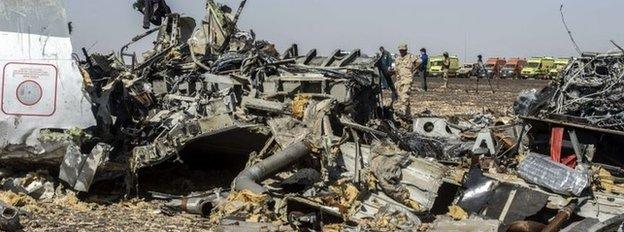Sinai plane crash: Bomb fears prompt Sharm flight cancellations
- Published
Foreign Secretary Philip Hammond: ''There will be no UK passenger flights out to Sharm el-Sheikh from now''
The UK has halted all flights between Britain and Sharm el-Sheikh in Egypt, saying there is a "significant possibility" an explosive device caused the Russian plane crash at the weekend.
The decision was taken after experts reviewed the airport's security, Foreign Secretary Philip Hammond said.
Officials are working with airlines on special flights to bring UK tourists at the resort home as soon as possible.
Russian Airbus 321 crashed on Saturday, killing all 224 people on board.
The Metrojet flight bound for St Petersburg from Sharm el-Sheikh came down in Egypt's Sinai desert.
Mr Hammond said: "We have concluded there was a significant possibility that that crash was caused by an explosive device on board the aircraft."
The US also said initial intelligence suggested the plane was brought down by a bomb.
'Emergency procedures'
The UK government was "very reluctantly" advising against all but essential travel through Sharm el-Sheikh airport, Mr Hammond said.
However, Mr Hammond stressed the Foreign Office was not changing the travel advice with regard to the Sharm el-Sheikh, external resort itself, which it views as safe.
There are currently about 20,000 British nationals in Sharm el-Sheikh, of which the Association of British Travel Agents estimates at least 9,000 are holidaymakers.
Passenger Sarah Cotterill: ''It looks like we are definitely going to be here all night''
Officials were working with airlines and Egyptian authorities to put in place "emergency procedures" for additional screening and security to be put in place to allow British holidaymakers to fly home safely, Mr Hammond added.
BBC political correspondent Chris Mason said he understood the British government's aim was to ensure flights could start leaving Sharm el-Sheikh for the UK as soon as possible - perhaps as early as Friday.
UK officials at the airport will act as extra security and effectively sign off planes as safe to travel, he said.
Egypt's foreign minister, Sameh Shoukry, earlier said he was very disappointed by the decision to suspend flights, accusing the UK government of making "a premature and unwarranted statement" on the crash.
Egypt's President Sisi is currently in the UK and is due to meet Prime Minister David Cameron on Thursday.

Analysis

By Frank Gardner, BBC security correspondent
Almost from the moment it was confirmed that Metrojet Flight 9268 had crashed into the Sinai desert, British counter-terrorism officials have been looking at what could have brought it down and what the implications were for the safety of Britons abroad.
The analysis has brought together aviation and anti-terrorism experts.
The Egyptian authorities were quick to dismiss claims by so-called Islamic State that they brought the plane down.
However, British officials now say "new intelligence" has come to light pointing increasingly towards the possibility of terrorism.
They have not revealed what that new intelligence is, or where it came from.
But the government says it cannot take a risk with the safety of so many Britons flying to and from such a popular resort.

Their findings were considered in a one-hour meeting of the government's Cobra emergency committee on Wednesday evening, chaired by Mr Cameron, ahead of Mr Hammond's statement.
Ibrahim Mustapha in Sharm el-Sheikh: ''Confusion is reigning here''
Mr Hammond apologised for the "immense disruption and inconvenience" caused by the decision.
"I also recognise the immense impact that this will have on the Egyptian economy," he added.
"But we have to put the safety and security of British nationals above all other considerations."
Extra consular staff have been deployed to the airport, Downing Street earlier said.
A number of travel operators have responded to the government's announcement:
Thomas Cook, external has cancelled its flight and holiday programme to Sharm el-Sheikh until 12 November
Thomson Airways, external along with First Choice, external, have cancelled all outbound flights to Sharm el-Sheikh up to and including 12 November
British Airways, external has postponed its Thursday flights to and from Sharm el-Sheikh until Friday
EasyJet, external has cancelled all flights to and from the resort on Thursday and is keeping future flights "under review"
Monarch, external has cancelled all flights in and out of Sharm el-Sheikh on Thursday
The Irish Aviation Authority, external said it had directed Irish airlines not to fly to or from the area until further notice
British holidaymaker Craig Peacock, who has been in Egypt for nine days, said finding out he may not be able to return home is "not the greatest news".
But, he said, postponing flights was "the right thing", adding: "We don't want a repeat of what happened last week".
However, Helen Collins, on holiday in Luxor, said the government had made a "bad decision".
"I think that nowadays, this could happen anywhere in the world, and I feel really sorry for the Egyptians because I know that they have had a real drop in the number of tourists that are coming to Egypt."